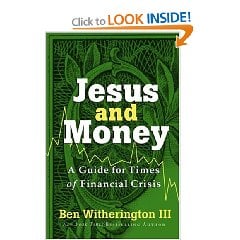My book Jesus and Money is being picked up as a textbook this Fall, including at Greenville College in Ill. where I will be giving the Convocation Address this week. Here is the text of the address.
JESUS AND MONEY
Money
is like truth serum. Whoever touches it turns either into gold or lead, which
is to say, money, and what people do with it reveals their character. The hoarder, like the man who stored things
up in barns in Jesus’ parable, simply further indulges his propensity to
hoard. The miser like Scrooge continues
to be miserly unless he has the extreme makeover or a character change. The compassionate person is given further
opportunities to express that character, and so on.
There
is a reason why there are more warnings about the dangers of money and riches
in the NT than there are remarks about dying and going to heaven. ‘Where a person’s treasure is, therein lies
that person’s heart.’ We must talk
seriously about these things, but first we need to set the framework for our
discussion.
Is there such a
thing as a Biblical theology of property, a normative statement on
‘materiality’? I think the answer to
this is yes. The Psalmist enunciates it
quite well reflecting on his creation theology—- ‘the earth is the Lord’s and
the fullness there of’. Not just ten
percent, but everything belongs to God.
It is all God’s property. In
fact, we are God’s property. Now if this
is true, then in the ultimate sense we are not really owners of anything. We did not bring anything with us into this
world and even if we are buried with our pink Cadillacs we can’t really take it
with us. Joke about man who took gold bullion
to heaven with him.
What the Bible
says about property is that God is the owner, and we are only stewards of God’s
property. Now this cuts against theories of both godless communism and godless
capitalism as well. And if we are merely
stewards of God’s property, then we need to constantly be asking God—- what
should I be doing with this or that piece of property you have loaned me? In other words, like any good steward, we
need to check with the owner before making financial decisions, even seemingly
trivial ones. And if all else fails, we should read the Owner’s Manual—- I
mean the Bible of course. Alas, however
we live in a Jesus haunted culture that is Biblical illiterate, and that
illiteracy has allowed us to give free reign to all kinds of false ideas about
money, investing, retirement, the freedom to spend money of luxury items and
the like. One of the great problems in
the Christian life is not merely that we live without proper theological and
ethical reflection about what we do, we in fact give free reign to impulse
buying, subjecting ourselves to the bombardment of thousands of advertisements
a week. Even worse, we sometimes
convince ourselves we have some sort of patriotic duty to shop until we drop
cause ‘it’s good for the economy’.
Christian approaches to money and spending and saving and work hardly
enter our thought processes, so controlled are we by our urges, longings,
desires, wants…. even more than by our actual needs. Jesus understood that the heart of the matter
is a matter of the heart. The heart is
the heart of the problem. Let’s listen
to what Jesus says.
First of all Jesus
tells us “do not store up treasures on earth, where moth and rust consume, and
thieves break in and steal, rather store up treasures in heaven”. What is he
talking about? Is he envisioning some sort of heavenly bank
account we can invest in, in order to have ‘our best life now’? Well no.
He is talking about stifling the acquisitive instinct, and instead of
saving for your own future, you should be investing in the lives of others and
trusting God for the future.
This word just
in— there is no theology of retirement in the Bible, no theology of pension
or nest egg. There is a theology of rest
and blessing, but that is a different matter.
The real issue here is where one places one’s ultimate trust (as
manifested in what one does with one’s money) and where one’s sense of ultimate
security lies— in one’s bank account or in one’s Lord. It’s a heart issue and a faith issue. Jesus warns that there can be no half and
half solution— you can’t half way serve Mammon and half way serve God. Then you have two absolute masters, and that absolutely doesn’t work.
Anytime you see a
‘therefore’ in Scripture you need to ask what is it there for, and we have
precisely this sort of thing after Jesus’ famous two masters aphorism. Since you cannot serve two masters, therefore
what you ought to do is “don’t worry about your life, what you will eat or
drink, or about your body what you will wear.”
He is saying we should not be fretting and sweating over the necessities
of life, how much less should we be having an anxiety attack about what
luxuries we don’t have. Anyway, he tells
us we can’t add a moment to our lives by worrying, even about the necessities
like where our next meal is coming from.
Worry is a
condition of the heart— a heart matter.
Are you a worry wart? What this
reflects is a lack of trust in God— put bluntly. God knows what we need to live, what we need
to thrive, what we need to be good stewards and we should trust God will
provide these necessities of life. It is
in that context that Jesus adds “Seek first the kingdom of God
and all these things will be added”.
What are these things? The context is clear. They do not include gas
guzzling SUVs, bling, expensive cellphones, expensive clothes etc. ‘These things’ in this text clearly refers to
the necessities of life. So we should
not be praying the old Janis Joplin song in our heads—- ‘Oh Lord won’t you
buy me a Mercedes Benz…..’
Similarly, in Mt.
7 when Jesus says ask, seek, and knock and it will be given, he is not talking
about God blessing you with wealth and riches and things that ruin your
character and turn you into a narcissistic fool, he’s talking about God taking
care of your basic needs in life. There
is a false theology, very popular in some quarters in the conservative
Protestant church. The name it and claim
theology, or the ‘God wants you rich’ theology.
Besides the fact this is totally false and unbiblical, it fails to
recognize that God knows perfectly well we are all fallen creatures with fallen
desires, and you can pray until you are blue in the face, but God is not likely
to give you things that will ruin your Christian character because he knows
what is best for you, and is a good Father to us all. He is not like the Father who gives his
daughter a snake when she asks for a fish. God is also not a cosmic prize
patrol Dude at your beck and call just because you ask nicely for this that or
the other. You can’t make God an offer he can’t refuse’ Period.
Is money
inherently evil then? Of course not. It
is part of God’s good creation. The
problem lies in the human heart, hence Paul stresses ‘the love of money is a root of all sorts of evil’. He’s right about that— the lusts of the
heart plague us all in one form or another. If its
not the love of money it’s the love of clothes, if its not the love of clothes
it’s the love of Ipods and downloads, if its not the love of Ipods it’s the
love of cars, if its not the love of cars, it’s the lusting after girls, girls,
girls, or boys, boys boys. There is a
difference between lusts of the heart and real love, but our culture hardly can
tell the differences any more.
It is a fact that
Jesus told us to pay our taxes to the Emperor, or to the temple. It is also a fact that he encouraged us to
generosity and self-sacrificial behavior.
The story of the widow and her two ‘mites’ or lepta urges us to do more
than tithing, it urges us to self-sacrificial behavior. There is not a mandate in the NT for
Christians to tithe, but there certainly is a mandate to give
self-sacrificially. By now I think you catch my drift. If you are well grounded in God’s Word, you
will realize that the siren song of our culture about money and material
possessions is not the trumpet call of God.
We have been led down the path to massive debt, ridiculous indulgence of
desires, not needs mind you, but wants and desires. We are a debtor nation, and
Christians are often the worst examples of this problem. Fortunately, there is a way back from the
brink of disaster, a way to life wisely and without anxiety about
necessities. Here are some of the basic
principles of life:
1)
recognize each day that you are not an owner of
anything, only a steward of God’s property;
2)
this leads to the necessity of consultation. You must
pray and seek Biblical guidance before buying things, especially luxury items
3)
Make up a list of the necessities and luxuries in your
life. God has promised to help you with
the former, but he may well want to alleviate you of the latter, especially if
it gets in the way of his soul work in you.
4)
Ask the hard questions and learn how to critically
discern the differences between a necessity in your life and a luxury. For some
of you, having a car is a necessity of life, for work purposes etc. For some of you, it is not. No one set of rules fits us all in most
matters of material possessions. The
gifted concert trumpet player needs a trumpet.
I do not.
5)
Stay out of debt to the best of your ability. Pay for things as you go, and don’t borrow
ridiculous amounts of money at crushing interest rates. By the way most credit
cards have crushing interest rates if you don’t pay them off each month. Tear up such cards, and live with just a
debit card.
6)
Don’t waste any of the currencies of life— your
money, your time, your talents etc.
7)
Give and give back more than you take and acquire. Set
an example of self-sacrificial behavior like that of Jesus
8)
Trust God, and move on faith in the directions he wants
you to go. God reveals enough about the future to give you hope, but not so
much that you don’t have to live by faith every day of your life. Put your trust in God, not your possessions,
or else they will possess you.
9)
Some things in life really are priceless— your
salvation, your relationship with the Lord, life experiences that form you in
the image of Christ and his great love for everyone. Make the main thing the main thing and count
your blessings. Money can’t buy you love
or happiness or a good relationship with parents or children or friends or with
God.
10)
Learn in detail what the Bible says about the earth and
all its material things. You have been
blessed to be a blessing to others— this means no hoarding, no miserly
open hand, giving to others, not the clinched fist, clinging to what loose
change one has. Read the parable of the
rich man and Lazarus. It is a sober reminder that how you deal with money and
the poor and other related matters can affect your eternal destiny. No wonder Jesus said—- ‘Blessed are the
poor, for yours is the Kingdom
of God’. I suspect many of you can claim that
beatitude as your own, because many students are poor today. The test will come when you begin to have
money. That will reveal what your real
character is. Are you ready for that
test/ I hope you are, and I pray that
you pass it.


